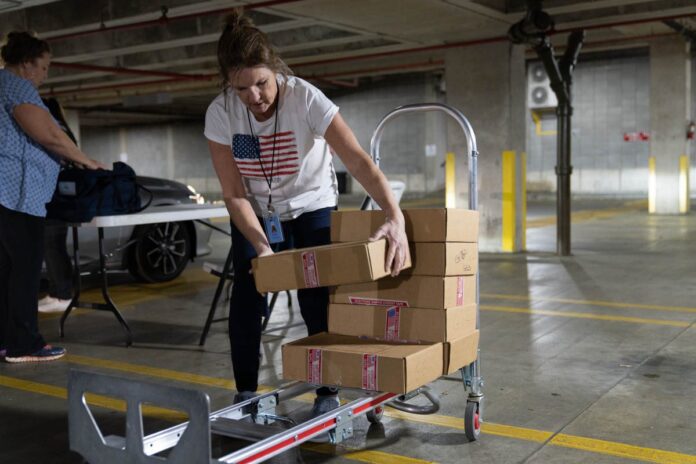Featured photo: Election workers in Guilford County transport ballots on election night in 2020. (photo by Carolyn de Berry)
Experts have been saying this for a while, but there’s a high chance that we won’t know who the winner of the presidential race is until as late as next week.
Here’s what’s going on.
Elections in the US are highly decentralized and complex. While uncontested or landslide races may be called right after polls close, competitive races may take days, or even weeks to call. And while some states like Florida count most of the ballots on Election Day, other states, like California, can take weeks.
For example, in 2020, the Associated Press called North Carolina for Trump on Nov. 13, 10 days after Election Day. For Georgia, the race was called for Biden on Nov. 19, 16 days after Election Day after hand recounts. This could very well happen again.
The US also doesn’t have a nationwide body that collects and releases election results. Instead, journalists gather data from local and state agencies that report election results publicly. The Associated Press gathers this data and makes it available to the public and to other newsrooms, to count the votes and then declare winners. They’ve been doing this in presidential elections since 1848.
And that’s because each state has different rules and laws when it comes to running elections. Some states allow for early voting ballots to be counted before Election Day, like in North Carolina. Some states have voter ID laws, like NC, which can delay counts due to provisional ballots.
In Pennsylvania, election workers are not allowed to start processing mail-in ballots until Election Day. That can mean results take longer to post.
In NC, the voter ID law is new for this general election. New rules also mean that mail ballots are now due on Election Day which is different than past elections. For a rundown on different election rules for various states, read this New York Times piece here.
In close races, recounts and legal challenges are possible. In fact, the Trump campaign has already geared up to file several lawsuits that cast doubts on the veracity of the election results. As the organization Protect Democracy has outlined, loopholes in NC law may lead to state lawmakers attempting to overturn the will of the voters by appointing alternative presidential electors.
But let’s be clear. That is deliberately going against the will of the people and their votes.
In fact, US elections, despite ongoing disinformation sown by the Trump campaign, are historically and presently, very safe and secure.
While the voting process isn’t immune to problems, and it’s likely some things may go wrong on Election Day — whether it’s long lines at polling places, running out of ballots or temporarily downed voting machines — these problems will not be unique to this election . There have always been glitches in our election process. Despite some imperfections, the system reliably produces certified outcomes thanks to many safeguards in place.
As election directors Tim Tsujii and Charlie Colicutt told TCB last month, all voting machines are tested before the election and election workers do a recount of two randomly selected precincts after the election. That means there’s pre-election and post-election testing.
So here are the takeaways. We likely won’t have final results for some of the races, including the presidential race for days after Election Day. That is because states all have different rules around counting votes. This does not mean that the election is being stolen or that there is widespread election fraud. US elections have historically been and are currently very secure. Don’t spread mis- or disinformation. And if you see it online or within your circles, tell people why things are happening the way they are. Don’t let them fall prey to fearmongering by bad actors.
Our votes matter. They are safe. And the will of the people will be clear if we are patient.
Join the First Amendment Society, a membership that goes directly to funding TCB‘s newsroom.
We believe that reporting can save the world.
The TCB First Amendment Society recognizes the vital role of a free, unfettered press with a bundling of local experiences designed to build community, and unique engagements with our newsroom that will help you understand, and shape, local journalism’s critical role in uplifting the people in our cities.
All revenue goes directly into the newsroom as reporters’ salaries and freelance commissions.



